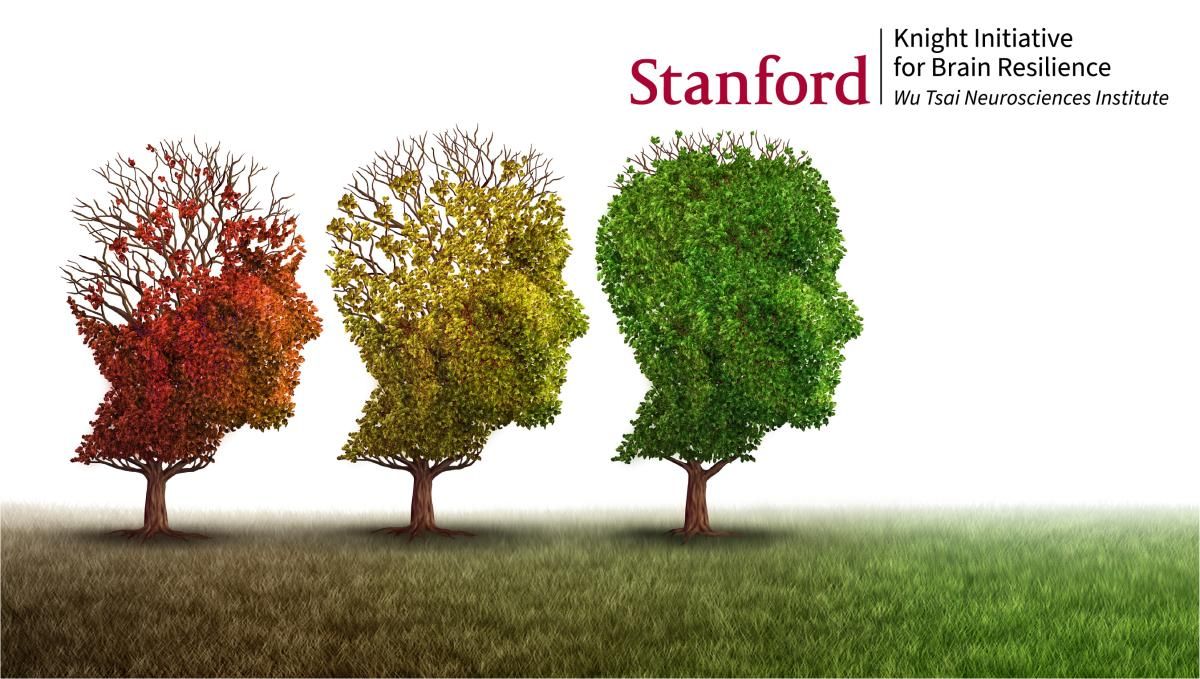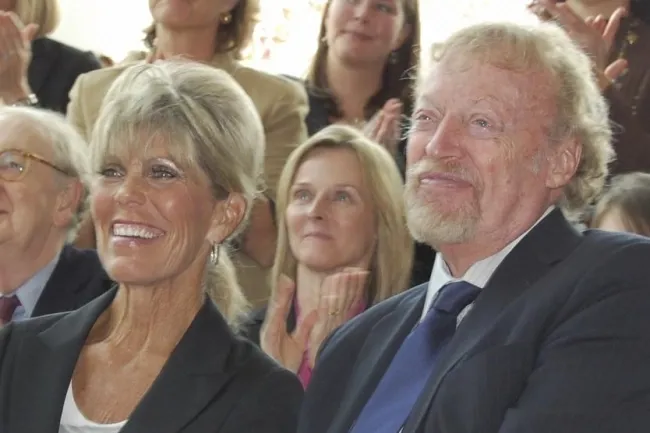
Gift from Phil and Penny Knight launches scientific endeavor to combat neurodegeneration
A new initiative on brain resilience will study the causes of cognitive decline – what may be done to prevent, delay, or reverse the decline – and what goes right for those who keep their cognitive abilities intact.
A new campus-wide initiative will harness Stanford’s multidisciplinary scientific expertise to tackle one of the most baffling questions in brain science: Why do some people succumb to degenerative brain diseases such as Alzheimer’s and Parkinson’s while others reach their 90s with their mental acuity intact?
Based at the Wu Tsai Neurosciences Institute, this scientific endeavor is being launched by a $75 million gift from Nike founder Philip H. Knight, MBA ’62, and his wife, Penny. Tony Wyss-Coray, the D. H. Chen Distinguished Professor II of Neurology and Neurological Sciences at Stanford, has been appointed the inaugural director of the Phil and Penny Knight Initiative for Brain Resilience.
“This initiative will examine long-standing assumptions about the causes of neurodegeneration and advance our understanding of how to maintain brain resilience into old age, which is a cornerstone of quality of life,” said Stanford President Marc Tessier-Lavigne, who is a pioneering neuroscientist himself. “As one of the field’s leading experts in brain degeneration and aging, Tony Wyss-Coray is perfectly positioned to lead this important endeavor. I am so thankful to Penny and Phil for their generosity, and for their commitment to transforming millions of lives for the better.”
/f/78141/854x1280/89dd0a1c63/tony-wyss-coray.jpg)
Tony Wyss-Coray, the D. H. Chen Distinguished Professor II of Neurology and Neurological Sciences at Stanford, has been appointed the inaugural director of the Phil and Penny Knight Initiative for Brain Resilience. Photo: Gary Wagner
The Phil and Penny Knight Initiative for Brain Resilience will leverage Stanford’s interdisciplinary expertise in medicine, neurosciences, engineering, human biology, chemistry, psychology, and many other fields to foster first-of-their-kind collaborations among researchers, clinicians, and scholars. The goal is to spark new ideas and innovations and take knowledge to a point where it is possible to promote brain rejuvenation and stave off certain brain disorders, as well as prevent and treat cognitive decline.
“As Phil and I get older, we are seeing the devastating impact of neurodegeneration on our friends and loved ones,” Penny Knight said. “We are calling it the ‘Initiative for Brain Resilience’ because we want to focus on the positive outcomes this important research may yield – healthy aging and the possibility of helping all people live fuller, more vibrant lives late into life. We are excited to invest behind our belief that Stanford is the place to make this happen, and we feel privileged to have the opportunity to do so.”
The Knights have long been supporters of Stanford. Their 2016 gift launched the Knight-Hennessy Scholars program, a graduate-level scholarship to prepare a new generation of global leaders with the skills to address the increasingly complex challenges facing the world. They also made a major gift to construct the Knight Management Center of Stanford Graduate School of Business and have provided substantial support for endowed professorships and Stanford Athletics.
Hope over pain
As more people worldwide are living longer, the urgency of understanding neurodegeneration and finding treatments for crippling, often fatal conditions continues to grow. Most people know someone who has suffered from a neurodegenerative disease, and it can be a heartbreaking experience to witness. Once-vibrant individuals lose mental capacity, see decades of memories slip away, experience physical and verbal symptoms, and become dependent on others for care. Despite decades and billions of dollars in research, there is still much to learn about the fundamental mechanisms of this decline and little that can be done to stop or reverse it.
Knight Initiative Steering Committee
The Steering Committee helps unite Stanford’s scientific community across disciplines in catalyzing discoveries in brain resilience and neurodegeneration.
Monther Abu-Remaileh, assistant professor of chemical engineering in the School of Engineering and, by courtesy, of genetics in the School of Medicine
Anne Brunet, the Michele and Timothy Barakett Professor of Genetics
Karl Deisseroth, the D.H. Chen Professor of Bioengineering in the School of Engineering and of psychiatry and behavioral sciences in the School of Medicine
Aaron Gitler, Stanford Medicine Basic Science Professor and professor of genetics
Michael Greicius, the Iqbal Farrukh and Asad Jamal Professor and professor of neurology and neurological sciences and, by courtesy, of psychiatry and behavioral sciences
Thomas Montine, professor of pathology in the School of Medicine and chair of the Department of Pathology
Sylvia Plevritis, professor of biomedical data science and of radiology, and chair of Biomedical Data Science
Kathleen Poston, professor of neurology, and chief of the Movement Disorders Division of Neurology and, by courtesy, professor of neurosurgery
Kang Shen, professor of biology in the School of Humanities and Sciences and of pathology in the School of Medicine
The Knight Initiative for Brain Resilience is targeted at both the causes of decline and potential treatments and will pursue three distinct avenues of research. The first will focus on human neuroscience to clarify uniquely human aspects of brain aging and why some people experience relatively early declines in cognitive function while others appear protected long into old age. The second avenue will cultivate new approaches via fundamental neuroscience, identifying foundational principles of brain health, how the brain develops, and how it ages. The third pathway will seek targeted neurotherapeutics through early diagnostics and effective treatments for brain degeneration as well as techniques that encourage healthy aging and brain resilience.
William Newsome, the Vincent V. C. Woo Director of the Wu Tsai Neurosciences Institute, says the Knight Initiative will lead pioneering brain research to develop better therapies and improve the human condition. Newsome played a leading role in working with a cross-disciplinary team of Stanford faculty to craft the vision for the initiative.
“Despite concerted research on many fronts over the past few decades, we are still not much closer to understanding the inner workings of healthy brains and the things that go wrong in neurodegenerative diseases like Alzheimer’s and Parkinson’s. The fact is that there are essentially no effective treatments for most of these conditions,” Newsome said. “Over nearly a decade, we have built a collaborative, cross-disciplinary neuroscience community at Stanford to tackle big questions about the human brain and behavior that could not be solved within our old silos. Thanks to Penny and Phil’s vision and Tony’s expert leadership, the time is right to use that strong foundation to launch this bold initiative and transform how we think about brain aging and resilience.”
A new era of brain science
By uniting faculty and labs from across Stanford’s many schools and disciplines to collaboratively tackle big questions about the human brain and behavior – questions that cannot be addressed within traditional academic boundaries – the Knight Initiative aims to accelerate a new era of brain science. Nearly 500 faculty members are already engaged in the neurosciences through the Wu Tsai Neurosciences Institute, bringing expertise from fields ranging from cell biology and psychology all the way over to computer sciences, social sciences, and education.
“Forging new connections among Stanford clinical experts and Stanford’s leading basic scientists, engineers, researchers, and other scientific staff will bring novel collaborations, perspectives, and technologies into our ability to treat the whole patient, keeping people healthy and thriving longer,” said Lloyd Minor, the Carl and Elizabeth Naumann Dean of Stanford Medicine.
Wyss-Coray says that neuroscience as a field is at a major inflection point.

Philip H. Knight, MBA ’62, and his wife, Penny. Photo: Courtesy Phil and Penny Knight
“Landmark advances have yielded new tools and techniques that now make it possible to observe and even tune the circuits of a living brain. These include the sequencing of the human genome, the analysis of the brain at the level of a single cell, revolutionary imaging capabilities, discoveries in nanoscience and physics, optogenetics, and human brain organogenesis,” Wyss-Coray said. “By uniting the Stanford neuroscience community around the unsolved challenge of neurodegeneration, the Knight Initiative aims to exploit these new tools and techniques, as well as the reduced barriers to interdisciplinary collaboration, to inspire a new science of brain aging and resilience and usher in a new era for brain science.”
Wyss-Coray is setting an aggressive research strategy for the Phil and Penny Knight Initiative for Brain Resilience – approaches that he believes will move the initiative toward its goals in a meaningful way and which are wholly within reach.
“About one in 10,000 individuals reaches age 100 relatively unscathed cognitively – seemingly resilient to the effects of time with intact memories and brain functions,” Wyss-Coray said. “The Phil and Penny Knight Initiative for Brain Resilience seeks to emulate this sidestepping of the aging process and raise the hope of reversing brain aging altogether to rejuvenate the mind.”